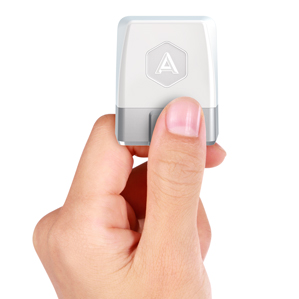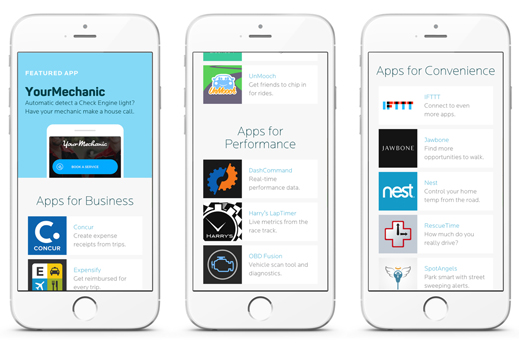Courting App Makers to Unlock Your Car’s Powerful Data Trove
As Thejo Kote and Ljuba Miljkovic see it, your car can do a lot more than just get you around town. The data that it’s constantly collecting can also be used to let your smart thermostat know to adjust the temperature because you’re heading home, or to help you log work-related trips for expense reports, or to send a “yo” to a friend when you start your car.

Kote and Miljkovic are founders of Automatic, a San Francisco startup that, for the past two years, has sold a $100 gadget that connects to your car’s built-in computer through its diagnostic port—an outlet built into every U.S. car since 1996—and sends encrypted data via Bluetooth about your driving to a mobile app so you can track things like gas mileage and driving habits (see “Gadget Gets Under the Hood to Bring Analytics to Driving”).
Today Automatic is announcing a big push to get developers to make all kinds of apps that take advantage of the data that its device collects. It’s releasing a host of new and reworked app-making tools, an app gallery that corrals apps that were already or are now compatible with Automatic, and a new version of its hardware that includes GPS and allows some apps to access a real-time stream of car data as the Automatic in-car dongle grabs it, without waiting for it to go through a remote server first.
Automatic is one of several startups selling diagnostic-port dongles that are asking outside developers to make apps that take advantage of the data that so many cars already collect, but most of us don’t have regular access to. This data, they think, could be used in smartphone apps that work with all kinds of cars to do everything from automatically splitting the cost of gas with friends to keeping an eye on how your teenager is doing behind the wheel.
“The car is a computer, and we have always been frustrated about the fact that it’s an expensive computer we use but it really can’t do much,” Kote says. “We think it can do a lot more, and that’s what we’ve been working toward.”
For Automatic, this has meant slowly drumming up developer interest by releasing an early version of its application-programming interface about a year ago, and working with companies like smart-thermostat maker Nest, Web-based response-trigger service IFTTT (“If This, Then That”), and street parking alert app SpotAngels to make their apps tie in with the data that its device snags.

Now Automatic is trying to go further. More than 20 apps will be available initially through the Automatic App Gallery, ranging from the helpful to the frivolous. These include a time-management app called RescueTime and the “Yo”-sending social app Yo (it sends a “yo” to people of your choosing when you start or finish a trip).
There will also be a few apps that will work with the new Automatic device’s support for real-time car data, such as the engine data app Dash Command and the route and time-logging app Harry’s LapTimer. For now, the data stream will be available by invitation only so the company can iron out any bugs.
The apps may be free or paid; Automatic is simply organizing them online and directing users to the right place to download the apps, which could be Google Play, Apple’s App Store, or elsewhere.
Mojio, a similar company based in Vancouver that sells a $149 diagnostic-port dongle with GPS, plans to do likewise. Cofounder and CEO Jay Giraud says Mojio will roll out its own app marketplace with a number of consumer and enterprise apps in June.
“It seemed obvious to me that if my car could be connected, I thought of a bunch of things I’d want to do,” he says. “And I thought, there’s no way one company can do all that.”
Mojio’s device has a key difference from Automatic’s: it includes a wireless network connection that users pay $5 per month for after the first year. That means it doesn’t even need your smartphone to be in the car for it to act on something—for instance, Cloak, an app that Mojio plans to release this week, will sound an alarm on your smartphone if your car is stolen and show its location on a map.
Like Automatic, Mojio is compatible with IFTTT’s apps, but for now there aren’t many others that work with it. Giraud says that there are more than 500 “active” Mojio developers working on apps, including insurance companies and car dealerships, and the company has also held a number of hackathons, including one in San Francisco this month, to spur more developers to make compatible apps.
Getting and keeping developers interested will be a challenge for both companies. User requests for all kinds of features make Kote confident that there are plenty of problems that apps could solve, though, whether they’re related to driving to work or simply seeing more information about what’s happening under the hood.
“There is no one single killer app,” he says.
Keep Reading
Most Popular
Large language models can do jaw-dropping things. But nobody knows exactly why.
And that's a problem. Figuring it out is one of the biggest scientific puzzles of our time and a crucial step towards controlling more powerful future models.
How scientists traced a mysterious covid case back to six toilets
When wastewater surveillance turns into a hunt for a single infected individual, the ethics get tricky.
The problem with plug-in hybrids? Their drivers.
Plug-in hybrids are often sold as a transition to EVs, but new data from Europe shows we’re still underestimating the emissions they produce.
Stay connected
Get the latest updates from
MIT Technology Review
Discover special offers, top stories, upcoming events, and more.